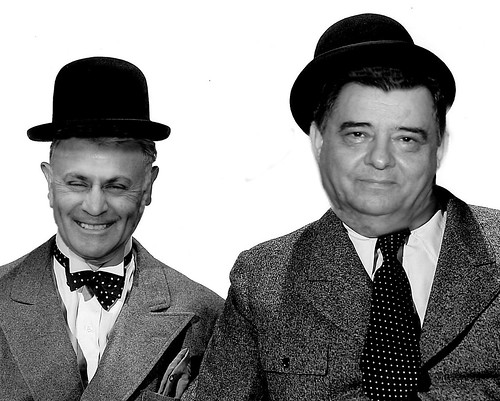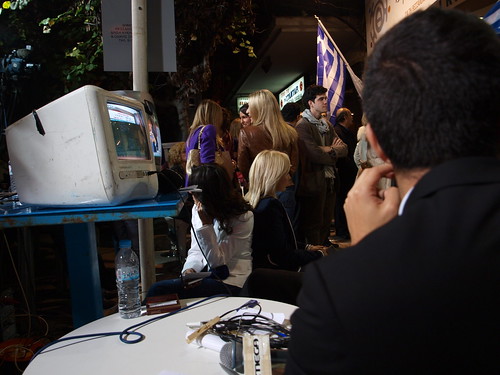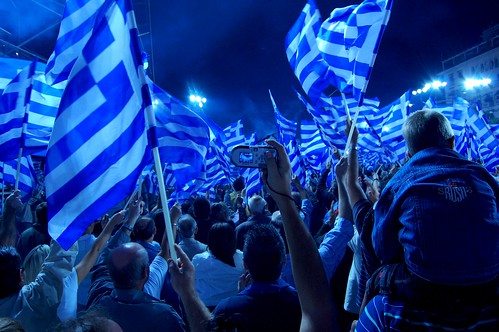Monday, November 08, 2010
Monday, November 01, 2010
Will Greece go to the polls in December? The elections no one wants to win.
No one in the present political set up, either on the left or the right set up has been able to turn an intense feeling of voter dissatisfaction into concrete electoral support. Obviously, the great loser in all this is the centre left PASOK party led by prime minister Giorgos Papandreou whose popularity has nose dived in the wake of the austerity measures imposed at the behest of the EU, ECB, IMF troika. However, the main opposition party, the conservative New Democracy has been unable to made much headway in the polls tainted as they are by their role in the country's economic meltdown. Even their newly elected leader Antonis Samaras's populist rhetoric has failed to convince many other than the party faithful.
On the other hand smaller parties of the left and right of the two main parties are also struggling to generate voter interest. On the far right LAOS, led by Giorgos Karatzaferis has failed to poach votes from New Democracy in the numbers it was expecting, the result, in part of its parliamentary support of the PASOK in passing the legislation and measures demanded by Greece's lenders.
Nor is the picture much better on the left with people wary of the Greek Communist party's old school ideological stance and its unwavering allegiance to the state run socialist economic model favoured by the Soviet Union in its heyday. The other reformist left wing coalitions languish in the polls, internally divided and struggling to get their message across in the media.
Underlying the growing indifference of Greek voters to the choices on offer is the realisations that whoever is in power their ability to change the present economic climate is limited as virtually all major economic decisions taken have to be okayed in Brussels, Strasburg and Washington. In addition an even deeper feeling of distrust of those in power comes from the deeply rooted idea that the country's rules are above the law and so free to abuse their position. This is hardly a new innovation and one that is central to modern Greek mindset but what has changed is the fact that the political caste's greed and incompetence has brought the nation to the edge of the abyss and so is no longer considered the acceptable price of getting things done.
Such extreme notions are reinforced by parliament's handling of recent corruption and bribery scandals involving the cases such asVatopedi Monestary, Siemens and the 2004 Athens Olympic games. These are just a few of the dozens of scandals that have racked Athens over the last few years and yet despite endless investigations not one politician has been convicted of a single misdemeanor, let alone spent time in jail. Many ordinary Greeks have come to the conclusion that whoever is in power, nothing will change and that once in charge the first priority of politicians is to line their own and their family's pockets at the expense of everyone else.
Given such cynicism and anger political analysts and leaders both left and right are worried about how this backlash will effect the vote in November and how the political landscape will be changed. Already the prime minister has warned that a major defeat for his party may result in the country going the polls again in a round new parliamentary elections. The national daily, Nea also published reports that Papandreou is considering a snap election as soon as December 12th in such an eventuality.
For Papandreou and many others the November elections are in reality a referendum on the bailout package and should his party lose badly that would require his government seek a new popular mandate. On the other hand political commentators have interpreted his words as political blackmail, a high stakes bluff aimed at getting reticent PASOK voters to the polls. If so, the costs of such a strategy are high indeed with the world's money markets jittery over the prospect of a change in government in Athens. Over the week Greek CDS's soaring once again above 800 points reflecting the financial world's unease at the prospect of a vote.
If Greece does go to the polls in December, both Papandreou and Samaras face the same dilemma that whoever wins is in no position to change the basic parameters of the current bailout deal and therefore will be associated in the popular imagination with job losses, painful spending cuts and a severe economic downturn.
The trick will be how to run a credible campaign yet not win, a feat the previous New Democracy leader, Kostas Karamanlis pulled off during his lukewarm campaign in 2009. Faced with immediate financial meltdown Karamanlis called early elections is September much to the annoyance of members of the party who wanted to wait till Spring 2010. However, they were unaware of just how dire the country's finances were and that by running early and losing New Democracy would still remain a coherent political force that could present itself as a credible alternative to PASOK once they had dealt with the financial mess at huge political cost.
Like the card game Black Maria in which the aim is to foist the Queen of Spades unto your opponent both main parties are supposedly gearing up to slug it out at the polls whilst secertly hoping that they will not have the misfortune to be in power.
Monday, February 01, 2010
ο Παναγιώτης Ψωμιάδης θα έχει το 100% της στήριξης του ΛΑΟΣ

ο Παναγιώτης Ψωμιάδης θα έχει το 100% της στήριξης του ΛΑΟΣ, originally uploaded by Teacher Dude's BBQ.
"ο κ. Καρατζαφέρης ανέφερε ότι ο Παναγιώτης Ψωμιάδης θα έχει το 100% της στήριξης του ΛΑΟΣ αν κατέβει υποψήφιος περιφερειάρχης. "Εμείς -είπε- ψάχνουμε υποψήφιους για τις άλλες περιφέρειες.Με τον κ. Ψωμιάδη συναντήθηκαν σε ώρα φαγητού "και τι πιο απλό για δύο καλούς φίλους να φάνε μαζί και να συζητήσουν", όπως ανέφερε ο κ. Καρατζαφέρης."
Tuesday, September 15, 2009
Giorgos Karatzaferis, head of Greece's far right LAOS party (right) condemned by Europe Commission Against Racism and Intolerance for anti - semitism

Giorgos Karatzafaeris, head of Geece's far right LAOS party (right) condemned by the Europe Commission Against Racism and Intolerance for anti - semitism, originally uploaded by Teacher Dude's BBQ.
European Commission Against Racism and Intolerance
"The leader of a right-wing extremist party ( LAOS led by Giorgos Karatzaferis) , which won approximately 3% of the votes in the 2007 parliamentary elections, often makes public antisemitic and racist statements, including blaming immigrants for a surge in drug-related crimes and violence. Thus far, he has not been prosecuted for any of these statements under Law 927/1979."
http://www.coe.int/t/dghl/monitoring/ecri/Country-by-country/Greece/GRC-CbC-IV-2009-031-ENG.pdf
Δημοσιεύθηκε η 4η έκθεση Συμβουλίου της Ευρώπης για φυλετικές διακρίσεις στην Ελλάδα
«Ο επικεφαλής του ακροδεξιού κόμματος ΛΑ.Ο.Σ. [σημ. Γιώργος Καρατζαφέρης]… κάνει συχνά δημόσια αντισημιτικές και ρατσιστικές δηλώσεις, κατηγορώντας ακόμη τους μετανάστες για αύξηση των εγκλημάτων που σχετίζονται με ναρκωτικά και της βίας. Έως τώρα, δεν έχει διωχθεί για καμία από αυτές τις δηλώσεις σύμφωνα με το Νόμο 927/1979.» (παρ. 91)
http://www.coe.int/t/dghl/monitoring/ecri/Country-by-country/Greece/GRC-CbC-IV-2009-031-GRC.pdf
Monday, September 07, 2009
Giorgos Karatzaferis - leader of Greece's far right LAOS party

Karatzaferis was speaking in Thessaloniki this afternoon. As head of the far right LAOS party he has spearheaded a campaign for mainstream legitimacy with regular appearances on TV chat shows and the like. The party was one of the few to make any gains during the recent European parliamentary elections, draining votes from the unpopular conservative New Democracy party. However, like so many politicians of his ilk he has more than a few skeletons in the closet, as this 2007 article from the Greek national daily, Kathimerini points out.
By Takis Kambylis - Kathimerini
“First of all, I am not a Jew. Can the prime minister say that of himself? Secondly, I am not a communist. Can Mr Karamanlis say that?” asked LAOS leader Giorgos Karatzaferis, speaking in Corinth on May 28, 2002. “Thirdly, I am not a homosexual. There aren’t many who can say that,” he added. He was not widely quoted at the time, but Karatzaferis is given to making remarks of a similar nature, and had in the past made reference to a grandfather of then Prime Minister Costas Simitis, Aaron Avouris.
Anti-Semitism has long been the LAOS leader’s favorite subject. Long before he founded LAOS, when he was still a parliamentary deputy for the New Democracy party, he had founded Nea Elpida (New Hope), something between a non-profit
firm and a political party, through which he made overtures to the extreme right-wing Chrysi Avgi (Golden Dawn) and its “worthy fighters.”


The news, which was quickly labelled political blackmail by his political opponents sent the cost of Greek government borrowing on the world's financial markets through the roof with CDS's topping 900 points. A reaction that reinforced Papandreou's claim that if voters did not support PASOK candidates the alternative would be financial disaster and political chaos.
Whether the high stakes bluff really prevented an all out electoral rout for PASOK is debatable with polls showing that 2/3 of Greeks rejecting the PM's dilemma. However, the use of such dramatic tactics so early on in the current administration's term is indicative of the massive drop in support for the government and growing dissatifaction with the austerity measures which have hit middle and working classes especially hard. Evidence of the effects of the economic crisis can be seen everywhere from a thousands of closed businesses to the growing number of homeless begging in the streets.
Many families are struggling even to pay utility bills as witnessed by recent statistics published in the Greek press which show that 1 in 4 electricity bills have gone unpaid. In addition the country's largest telecom provider OTE reported that half a million bills are overdue.
The announcement of yesterday's results was greeted by all parties as a victory with Giorgos Papandreou announcing that it showed that the country was behind his government's attempts to save Greece from bankruptcy and so ruling out new elections. Antonis Samaras, the leader of the largest opposition party New Democracy hailed the vote as an endorsement of his party's anti – Memorandum stance. Aleka Papariga, leader of the Greek Communist Party noted that her party was the only won to increase its share of the vote .
Although the Left benefitted somewhat from the anti – PASOK protest vote it failed to make enough headway to upset the political status quo, similarly, the far Right LAOS party who at one point seemed poised to supplant the more mainstream New Democracy in opposition paid the price for its support of the government's measures.
However, the fact that so many Greeks choose not to vote has worried many political commentators. That voter turn out was at a historical low reflected the disgust and antipathy many feels for the political choices on offer. Amongst ordinary people there is a growing sense of dissafection with the two major political parties and families who have dominated Greek politics since the restoration of democracy in 1974.
In the capital, Athens turn out was especially low with nearly 60% choosing not to vote, a figure that is nearer 70% if spoilt and unmarked ballots are included. After a succession of governments on the right and the left promising and failing to reform Greece's underperforming state, fight corruption and bring development only party die hards remain convinced that those in power can bring about the much needed changes required if the country is to survive in 21st century.
Feeling betrayed and angry with the “politics as usual” attaitude of the larger parties some voters, especially in Athens have turned to more extreme alternatives. The neo – nazi Golden dawn party received over 5% of the vote in the capital as a whole though in some districts the figure was over 20% guaranteeing them a seat on the Athens municipal council